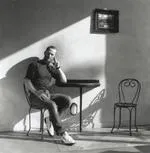NZ-Czech Cantata collaboration

The long opening poem 'There You Go' from David Howard's collection 'How To Occupy Our Selves' (Headworx, 2003) is a to be set as a cantata for female voice and piano by the Czech composer Marta Jirackova.
The long opening poem 'There You Go' from David Howard's collection 'How To Occupy Our Selves' (Headworx, 2003) is a to be set as a cantata for female voice and piano by the Czech composer Marta Jirackova.
This new work will partner their oratorio, 'The Carrion Flower', which was part of a body of work made possible by a 2002 Creative New Zealand project grant which Howard received to develop pieces based in Eastern Europe.
The Czech composer Marta Jirackova was born on March 22nd 1932 in Kladno, and studied at the Prague Conservatory of Music under Emil Hlobil, graduating in 1959. She undertook postgraduate studies with Alois Haba in harmony and composition, and subsequently studied with Ctirad Kohoutek and Alois Pinos at the Janacek Academy of Performing Arts in Brno.
Marta Jirackova's specific interest is in the human voice . This is evident in compositions such as "Eight Wonders of the World", "Three Songs a Without Lyrics", the two-part ballet "Five Times a Woman" and "The Ship of Fools", which was awarded the 1992 Prize of the Czech Music Fund.
Marta Jirackova's works also frequently explore the role of women. Her first symphony, "Nanda Devi", portrays the mountaineer Nanda Devi Unsoeld, who died while ascending the Himalayan mountain of the same name. Gender politics are central to the electroacoustic ballet variation "Five times A Woman" (1992).
Her most popular works include the song cycle "A Fairy-Tale Train" , which has been performed at hundreds of concerts, and her cycle of piano studies "The World of Children".